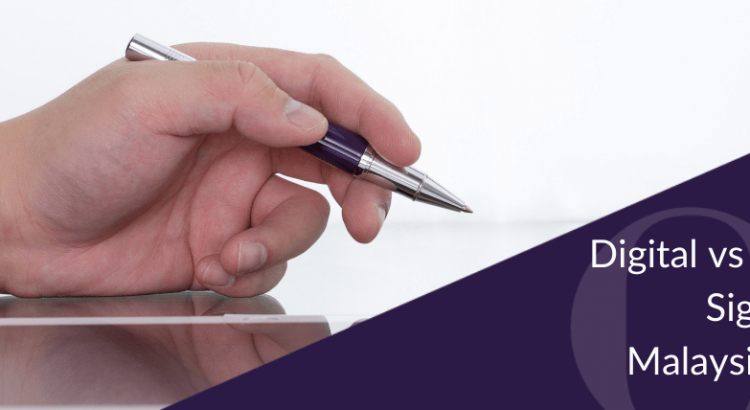When a face-to-face meeting is impossible, paperless signatures are a practical option for your business in Malaysia. They are fast, convenient and environmentally friendly.
However, you need to carefully consider the legal implications of using digital or electronic signatures over the traditional ‘wet-ink’ variety. While the terms ‘electronic’ and ‘digital’ are often used interchangeably to refer to paperless signatures, each one is a separate legal concept under Malaysian law.
In this article, we cover the differences between electronic and digital signatures in Malaysia, and explain when they are legally binding, and where you can use them.
What you need to know about electronic signatures in Malaysia
An electronic signature is defined by the Electronic Commerce Act 2000 (“ECA”) as:
“any letter, character, number, sound or any other symbol or any combination thereof created in an electronic form adopted by a person as a signature.”

Are electronic signatures legally binding in Malaysia?
The ECA legally recognises electronic signatures used in commercial transactions either:
- to fulfill legal requirements; or
- to facilitate commercial transactions through electronic means.
In Malaysia, electronic signatures are typically used for simple contracts and agreements (such as the ones outlined below) where the risk of legal disputes around document validity is low.
Electronic signatures are legally binding under Malaysian law, where they fulfil the ECA requirements, being:
- that the signature is attached to, or logically associated with, an electronic message;
- the signer and their approval of the related information can be adequately identified; and
- the signature is as reliable as is appropriate, given the purpose and circumstances for which the signature is required.
To be considered ‘reliable’, electronic signatures must also fulfill these ECA requirements:
- the means of creating the electronic signature is linked to, and under the control of, that person only;
- any alteration made to the electronic signature after signing is detectable; and
- any alteration made to that document after signing is detectable.
Some grey areas surround these requirements as they have largely been untested in Malaysia Courts. However, we recommend that companies adopt internal guidelines relating to the use of electronic signatures that outline the approvals process, digital security measures, electronic record keeping policies and compliance and internal audit team procedures. These guidelines can be used to provide evidence that the ECA requirements have been met. Companies may consult their lawyers or corporate secretarial agents for assistance in this regard.

Common electronic signature applications
There’s a reasonably broad scope when it comes to applying electronic signatures in Malaysia to execute documents. For example, case law suggests that even a text message can be considered a legally binding electronic signature under the ECA.
More typically, electronic signatures are commonly used in:
- HR documents: Employment contracts, benefits paperwork and new employee onboarding processes;
- Commercial agreements between corporate entities: Non-disclosure agreements, procurement documents and sales agreements;
- Commercial real estatedocuments: Lease agreements, and sales and purchase contracts; and
- Minutes and resolutions:(subject to the company’s constitution).
When deciding whether to use an electronic signature in Malaysia, it is important to note that while electronically signed documents are legally enforceable, wet-ink signatures may still be required for stamping and some filing and registration procedures. Some financial institutions may also require wet-ink signatures.
Where you can’t use electronic signatures
In Malaysia, electronic signatures are not allowed in:
- Power of Attorney documents as per section 2 (2) of the ECA;
- Wills, codicils and trusts as per section 2 (2) of ECA;
- Negotiable instruments, bills of exchange, and promissory notes as per section 2 (2) of the ECA;
- Any instrument dealing with properties under the Malaysian National Land Code; and
- Statutory Declarations under the Statutory Declarations Act 1960.
The documents listed above cannot be executed via e-signature or digital signature because they require notarisation or attestation before a public notary or commissioner of oaths. As such, wet-ink signatures are required for these documents.
What you need to know about digital signatures in Malaysia
Digital signatures are considered a subset of electronic signatures in Malaysia and are governed by the Digital Signatures Act 1997 (“DSA“).
A digital signature is defined by the DSA as:
“a transformation of a message using an asymmetric cryptosystem such that a person having the initial message and the signer’s public key can accurately determine:
a. whether the transformation was created using the private key that corresponds to the signer’s public key; and
b. whether the message had been altered since the transformation was made.”

Electronic signature software providers like DocuSign and HelloSign use certificate-based digital IDs to authenticate each signer’s identity, providing a higher level of security and assurance. Each digital signature is bound to the document via encryption to provide proof of signing, and is validated by licensed certification authorities.
In Malaysia, it is the role of licensed certification authorities to act as a trusted third party in verifying the identity of both the signer and the recipient of electronically signed documents.
Think about it this way, a digital signature requires a process, whereas an electronic signature can be implied – such as in the case of a text message.
Are digital signatures legally binding in Malaysia?
A digital signature that meets the DSA’s validity requirements is as legally binding in Malaysia as a handwritten signature, an affixed thumbprint or any other mark.
When the law requires a seal to be affixed to a document, a digital signature must be used.
Where you can’t use digital signatures
In Malaysia, like electronic signatures, digital signatures are also are not allowed in:
- Power of Attorney documents as per section 2 (2) of the ECA;
- Wills, codicils and trusts as per section 2 (2) of ECA;
- Negotiable instruments, bills of exchange, and promissory notes as per section 2 (2) of the ECA;
- Any instrument dealing with properties under the Malaysian National Land Code; and
- Statutory Declarations under the Statutory Declarations Act 1960.
Digital signatures must be validated by select authorities in Malaysia
Currently, there are no foreign certification authorities recognised in Malaysia. Digital signatures can only be validated with one of the following licensed certification authorities:
- Post Digicert Sdn Bhd;
- MSC Trustgate Sdn Bhd;
- Telekom Applied Business Sdn Bhd;
- Rafcomm Technologies Sdn Bhd;
Optimise your business with digitisation
A smart way to optimise your business processes is to use electronic and digital signatures, particularly when face-to-face meetings are not practical or possible. But – as we covered in this article – you need to fulfill specific legislative requirements in Malaysia to ensure that paperless signatures are legally binding.
Get in touch with our experts today to learn more about how they can help you implement innovative technological solutions to empower your business.



